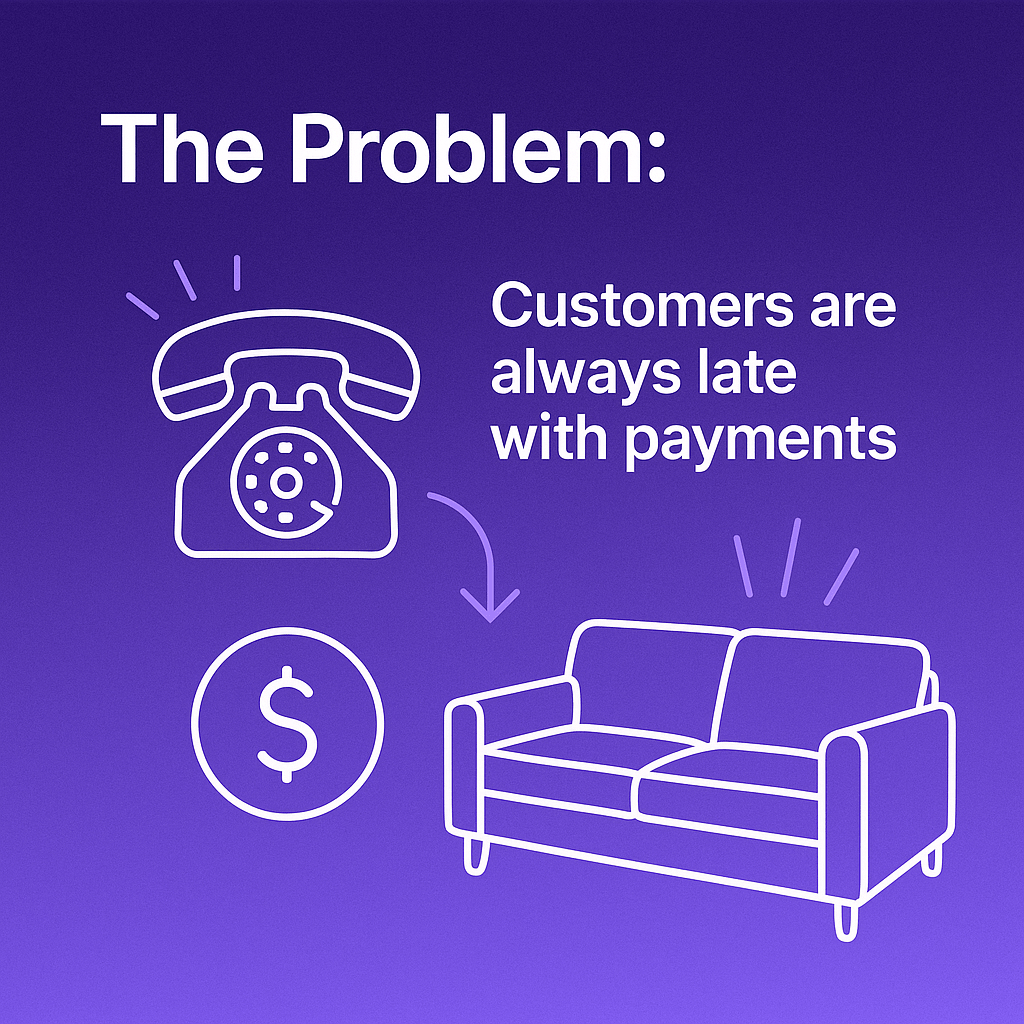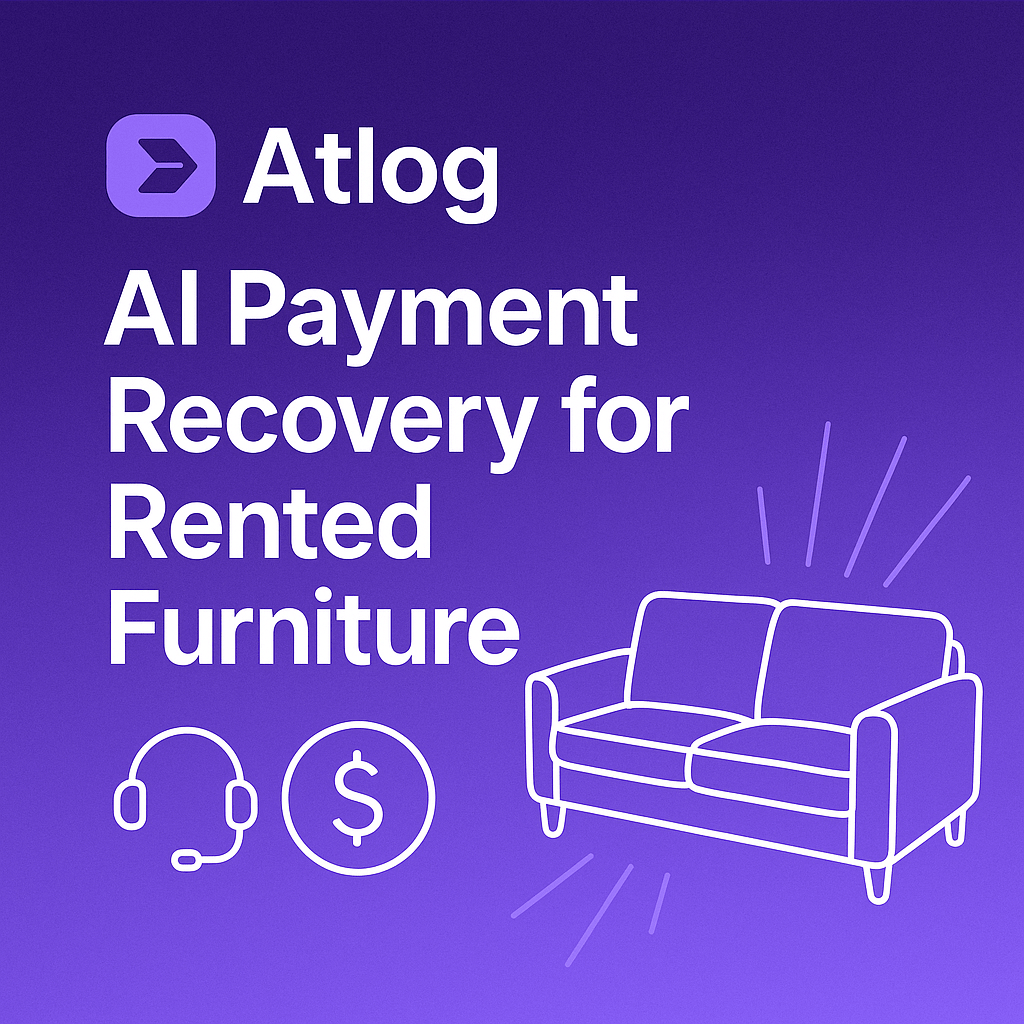Atlog: AI Back-Office Automation for Furniture Rental
The rent-to-own furniture industry caters to customers who often can’t access traditional financing due to poor or no credit history. While this inclusivity is a core strength, it also introduces operational headaches—chief among them, consistent late payments. These stores often write their own rental contracts, bypassing external financing institutions. That flexibility allows for broader access but places the burden of collections squarely on the business.
To keep the business running smoothly, stores must hire multiple staff members just to follow up on overdue payments. These employees must not only make hundreds of calls a week but also do so professionally, ethically, and in compliance with legal regulations. Yet, human error and burnout are common. Calls are missed. Scripts are not followed. Compliance statements are skipped. The result? Thousands of dollars are lost weekly per store, not to mention the annual loss of valuable inventory when customers disappear without paying.
How Is Atlog Solving the Collections Problem with AI?
Atlog is tackling this very challenge head-on by building AI voice agents that automate payment recovery calls. These AI agents aren’t just glorified robocallers—they are context-aware, bilingual (English and Spanish), and optimized to drive resolution.
The AI voice agents are programmed to:
- Call customers about late payments at the most optimal times.
- Engage in natural, human-like conversations.
- Handle negotiation strategies to avoid escalation to collections.
- Collect payments directly over the phone.
- Ensure compliance, such as informing the customer that the call is recorded.
By taking over this labor-intensive part of the business, Atlog allows furniture rental stores to significantly cut staffing costs, reduce human error, and increase payment recovery rates.
What Operational Problems Does Atlog Eliminate?
1. Staffing Overhead:
By replacing manual follow-ups with AI, store owners no longer need to hire multiple employees just for collections. This alone can free up thousands of dollars in monthly payroll expenses.
2. Compliance Issues:
Call center staff often forget or misstate legally required disclaimers. Atlog’s AI agent never skips these details, protecting stores from regulatory penalties.
3. Inefficiency and Missed Calls:
Human agents miss quotas, take breaks, and are inconsistent. Atlog’s AI agent works 24/7 if needed, doesn't fatigue, and hits every target without fail.
4. Lost Inventory:
Approximately 2% of store inventory is lost each year due to nonpayment. By improving payment recovery rates, Atlog helps mitigate these losses.
Who Are the Founders Behind Atlog?
Atlog was founded by a trio of Vanderbilt University students who bring a unique blend of technical, operational, and human insight to the problem they’re solving.
- John Bettinger (CTO): A Computer Science and Math student, John leads the technical development of the AI voice agents. His background in software engineering ensures the product is not only functional but scalable.
- Shaun Karakkattu (COO): With a double major in Economics and History, Shaun brings an operational mindset to the business side of Atlog. He understands both the bottom line and the stories behind the data.
- Vraj Parikh (Founder): A self-described “historian at heart,” Vraj is driven by curiosity and community. His passion lies in solving problems for real people—and for the communities he and Shaun grew up in.
Their personal backgrounds make the Atlog mission more than just a business venture. Growing up in neighborhoods where rent-to-own furniture was a staple of family life, Shaun and Vraj saw firsthand the kinds of issues these businesses and customers face. Atlog is their way of giving back to a system that once helped their own families.

What Differentiates Atlog’s AI Voice Agents from Existing Solutions?
Unlike basic automated call systems, Atlog’s AI voice agents are designed to communicate, not just notify. They don’t simply say “You’re late on a payment”—they carry on a conversation, answer questions, make suggestions, and guide customers toward resolving their dues. It’s conversational AI with empathy baked in.
Some standout features include:
- Bilingual Communication: The agents can seamlessly switch between English and Spanish, making them accessible to a broader demographic.
- Smart Scheduling: Calls are placed based on when the customer is most likely to answer and engage, increasing the success rate.
- Real-Time Payment Collection: Customers can settle dues right then and there—no need to transfer or wait.
- Dynamic Contact Tracing: The system updates and verifies contact information automatically, ensuring the outreach doesn’t go cold.
What Is Atlog’s Vision Beyond Collections?
While payment recovery is the immediate focus, Atlog’s ambitions are much broader. The ultimate goal? To create a fully AI-powered back-office assistant—a digital employee that can handle everything from account setup and documentation to returns processing and customer support.
This AI employee would allow furniture stores to run lean operations without compromising on service. In a world where retail is increasingly digital and staff turnover is high, such automation could be a game-changer.
Why Is Atlog Focusing on Furniture Stores First?
The furniture rental space is both underserved by tech and uniquely compatible with Atlog’s capabilities. Stores in this niche tend to have flexible but risky business models, making them ideal early adopters of technology that reduces financial uncertainty.
Furthermore, these businesses typically operate in local communities, where customer relationships matter. Atlog’s AI doesn’t seek to replace that human touch but rather enhance it by stepping in where consistency and scale are needed.
As Atlog grows, it envisions expanding into other types of rental businesses—appliances, electronics, and even vehicles. But starting with furniture stores allows them to build deep, tailored expertise and a rock-solid product.
What Kind of Impact Could Atlog Have on the Industry?
If adopted at scale, Atlog could fundamentally change how the furniture rental industry operates. Consider the ripple effects:
- Increased Recovery Rates: Stores recover more outstanding debt, leading to stronger cash flow and fewer defaults.
- Reduced Overhead: Savings on staffing and training allow businesses to reinvest in growth or lower prices for customers.
- Improved Customer Experience: With agents that actually help rather than threaten, customers are more likely to engage and resolve issues.
- Higher Retention and Trust: By keeping people out of collections, stores maintain goodwill and reduce churn.
Atlog isn’t just offering a service. It’s helping evolve a business model.
What’s Next for Atlog?
Currently active in the Spring 2025 YC batch, Atlog is refining its AI agents, onboarding early clients, and building out its tech stack for scale. The founders are focused on integrating feedback from their pilot customers to ensure the product fits seamlessly into store workflows.
Next on the roadmap:
- Expanding language support beyond English and Spanish.
- Adding modules for billing, contract management, and returns.
- Creating a full SaaS platform that plugs into point-of-sale systems for seamless automation.

Why Should the Market Pay Attention to Atlog?
In a world increasingly powered by automation, Atlog stands out by focusing on a forgotten niche — rent-to-own furniture stores and solving a real, painful problem with empathy and precision. They’ve combined personal experience, technical acumen, and startup hustle to build something genuinely useful.
And as they expand, their vision to build a complete AI-powered back-office assistant for retail could influence industries far beyond furniture.
Atlog isn’t just about recovering payments—it’s about reimagining retail from the inside out.

